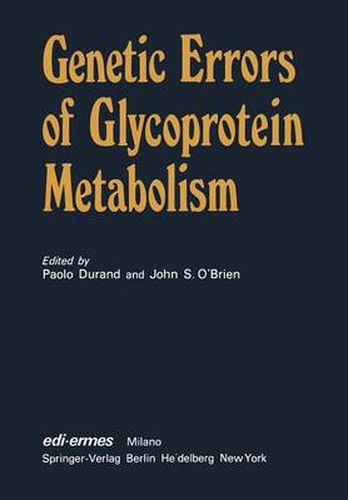Readings Newsletter
Become a Readings Member to make your shopping experience even easier.
Sign in or sign up for free!
You’re not far away from qualifying for FREE standard shipping within Australia
You’ve qualified for FREE standard shipping within Australia
The cart is loading…






This title is printed to order. This book may have been self-published. If so, we cannot guarantee the quality of the content. In the main most books will have gone through the editing process however some may not. We therefore suggest that you be aware of this before ordering this book. If in doubt check either the author or publisher’s details as we are unable to accept any returns unless they are faulty. Please contact us if you have any questions.
On starting to write the preface it occured to the editors that it might be a good idea to incorporate so me organizational thoughts. First of all, why have. we organized this book on Glycoprotein storage diseases , an unfamiliar area of pathology unlikely to be encountered in practice? In preparing such a volume we considered that in the past ten years there has been a large amount of intensive research activity on glycoproteinoses and no detailed review has been entirely devoted to this subject. This research has led to new information about hereditary mental retardation and progressive neurologie degeneration, and as clinicians we are impressed with its clinical importance. This volume is intended to represent for the uninitiated as weH as for the expert a summary of studies on dis orders of glycoprotein catabolism written by experts in each area. Each author has written with freedom about his particular experience, describing the establishment and development of his investigations, his methods, the utility and limitations of his work and eventual sources of problems. We are grateful for their many fundamental studies and for their having generously accepted to partecipate in this book. The Editors Acknowledgements We wish to express our gratitude to our friends and colleagues G. Romeo, W.S. Sly and G. Tettamanti whose criticism and suggestions have significantly improved the quality of particular chapters or sections.
$9.00 standard shipping within Australia
FREE standard shipping within Australia for orders over $100.00
Express & International shipping calculated at checkout
This title is printed to order. This book may have been self-published. If so, we cannot guarantee the quality of the content. In the main most books will have gone through the editing process however some may not. We therefore suggest that you be aware of this before ordering this book. If in doubt check either the author or publisher’s details as we are unable to accept any returns unless they are faulty. Please contact us if you have any questions.
On starting to write the preface it occured to the editors that it might be a good idea to incorporate so me organizational thoughts. First of all, why have. we organized this book on Glycoprotein storage diseases , an unfamiliar area of pathology unlikely to be encountered in practice? In preparing such a volume we considered that in the past ten years there has been a large amount of intensive research activity on glycoproteinoses and no detailed review has been entirely devoted to this subject. This research has led to new information about hereditary mental retardation and progressive neurologie degeneration, and as clinicians we are impressed with its clinical importance. This volume is intended to represent for the uninitiated as weH as for the expert a summary of studies on dis orders of glycoprotein catabolism written by experts in each area. Each author has written with freedom about his particular experience, describing the establishment and development of his investigations, his methods, the utility and limitations of his work and eventual sources of problems. We are grateful for their many fundamental studies and for their having generously accepted to partecipate in this book. The Editors Acknowledgements We wish to express our gratitude to our friends and colleagues G. Romeo, W.S. Sly and G. Tettamanti whose criticism and suggestions have significantly improved the quality of particular chapters or sections.